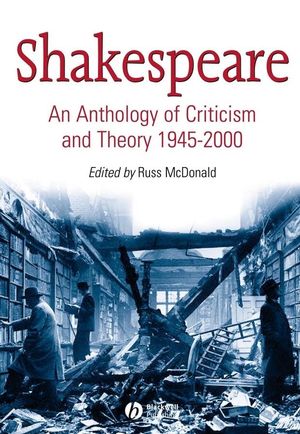|
Textbook
Shakespeare: An Anthology of Criticism and Theory 1945-2000ISBN: 978-0-631-23487-6
Hardcover
952 pages
January 2004, ©2004, Wiley-Blackwell
 This is a Print-on-Demand title. It will be printed specifically to fill your order. Please allow an additional 15-20 days delivery time. The book is not returnable.
Other Available Formats: Paperback
|
||||||
Acknowledgements.
1. Authorship.
Looney And The Oxfordians. (S. Schoenbaum).
2. New Criticism.
The Naked Babe And The Cloak Of Manliness. (Cleanth Brooks).
‘Honest’ In Othello. William Empson.
‘Introductory’ Chapter About The Tragedies. (Wolfgang Clemen).
The ‘New Criticism’ And ‘King Lear’. (William R. Keast).
3. Dramatic Kinds.
The Argument Of Comedy. (Northrop Frye).
Ambivalence: The Dialectic Of The Histories. (A.P Rossiter).
Introduction: The Saturnalian Pattern. (C. L. Barber).
The Jacobean Shakespeare. (Maynard Mack).
4. THE 1950s and ’60s: Structure, Theme, Character.
Reflections On The Sentimentalist’s Othello. (Barbara Everett).
Form And Formality In Romeo And Juliet. (Harry Levin).
King Lear Or Endgame. (Jan Kott).
The Cheapening Of The Stage. (Anne Righter).
How Not To Murder Caesar. (Sigurd Burckhardt).
5. Reader-Response Criticism.
On The Value Of Hamlet. (Stephen Booth).
Rabbits, Ducks, And (Henry V. Norman Rabkin).
6. Textual Criticism And Bibliography.
The New Textual Criticism Of Shakespeare. (Fredson Bowers).
Revising Shakespeare. Gary Taylor.
Narratives About Printed Shakespeare Texts: ‘Foul Papers’ And ‘Bad Quartos’. (Paul Werstine).
7. Psychoanalytic Readings.
‘Anger’s My Meat’: Feeding, Dependency, And Aggression In Coriolanus. (Janet Adelman).
The Avoidance Of Love: A Reading Of King Lear. (Stanley Cavell).
To Entrap The Wisest: Sacrificial Ambivalence In The Merchant Of Venice And Richard III. (Rene Girard).
What Did The King Know And When Did He Know It? Shakespearean Discourses And Psychoanalysis. (Harry Berger, Jr).
The Turn Of The Shrew. (Joel Fineman).
8. Historicism And New Historicism.
Introductory: The Cosmic Background. (E.M.W. Tillyard).
Invisible Bullets: Renaissance Authority And Its Subversion, Henry IV And (Henry V. Stephen Greenblatt).
The New Historicism In Renaissance Studies. (Jean Howard).
Shaping Fantasies: Figurations Of Gender And Power In Elizabethan Culture. (Louis Adrian Montrose).
9. Materialist Criticism.
Tradition And Experiment. (Robert Weimann).
Radical Tragedy. (Jonathan Dollimore).
Give An Account Of Shakespeare And Education, Showing Why You Think They Are Effective And What You Have Appreciated About Them; Support Your Comments With Precise References. (Alan Sinfield).
10. Feminist Criticism.
Egyptian Queens And Male Reviewers. (Linda Woodbridge).
‘I Wooed Thee With My Sword’: Shakespeare’s Tragic Paradigms. (Madelon Gohlke).
The Family In Shakespeare Studies; Or—Studies In The Family Of Shakespeareans; Or—The Politics Of Politics. (Lynda E. Boose).
Disrupting Sexual Difference. (Catherine Belsey).
11. Studies In Gender And Sexuality.
‘This That You Call Love’: Sexual And Social Tragedy In Othello. (Gayle Greene).
The Performance Of Desire. (Stephen Orgel).
The Secret Sharer. (Bruce Smith).
The Homoerotics Of Comedy. (Valerie Traub).
12. Performance Criticism.
Shakespeare And The Blackfriars Theatre. (Gerald Eades Bentley).
Conclusion: The Critical Revolution. (J.L. Styan).
William Shakespeare’s Romeo + Juliet: Everything’s Nice In America? (Barbara Hodgdon).
Deeper Meanings And Theatrical Technique: The Rhetoric Of Performance Criticism. (William Worthen).
13. Race And Postcolonialism.
‘Nymphs And Reapers Heavily Vanish’: The Discursive Con-Texts Of The Tempest. Francis Barker And Peter Hulme.
Sexuality And Racial Difference. (Ania Loomba).
Discourse And The Individual: The Case Of Colonialism In The Tempest. (Meredith Anne Skura).
14. Reading Closely.
Shakespeare’s Prose. (Jonas Barish).
The Play Of Phrase And Line. (George T. Wright).
Transfigurations: Shakespeare And Rhetoric. (Patricia Parker).
Index



